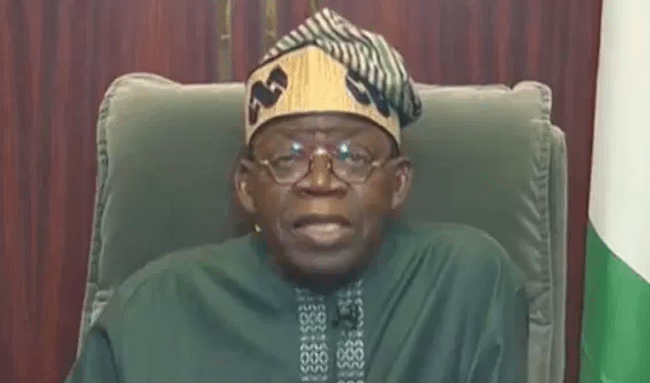The Socio-Economic Rights and Accountability Project (SERAP) has called on President Bola Tinubu to promptly reveal comprehensive information regarding the selection and appointment procedure for the next chairman of the Independent National Electoral Commission (INEC), following the impending conclusion of Professor Mahmood Yakubu’s tenure in November 2025.
SERAP emphasized the need for transparency by requesting disclosure of the number and identities of candidates considered for the INEC chairmanship, as well as confirmation on whether the constitutionally mandated consultation with the Council of State has taken place or will occur during the appointment process.
Additionally, SERAP urged President Tinubu to take this opportunity to review his previous appointments of at least three individuals allegedly affiliated with the All Progressives Congress (APC) as Resident Electoral Commissioners (RECs) of INEC, recommending their replacement with non-partisan nominees to uphold the commission’s impartiality.
Professor Mahmood Yakubu is set to complete his two-term, decade-long service as INEC chairman in November 2025. The president is expected to nominate his successor, subject to Senate approval.
In a letter dated 27 September 2025 and signed by SERAP’s deputy director Kolawole Oluwadare, the organization stressed that the process of selecting Mr. Yakubu’s replacement must not be conducted behind closed doors. They argued that a transparent and accountable approach would better serve the public interest.
SERAP highlighted the direct link between openness in the appointment process and INEC’s capacity to execute its constitutional and legal responsibilities independently and without bias.
Recognizing INEC’s pivotal role in Nigeria’s democracy, SERAP stated that transparency would enhance public confidence in the commission’s neutrality and encourage greater citizen engagement in electoral activities.
The letter further explained that transparency ensures the appointment of qualified and unbiased individuals, minimizes conflicts of interest, and allows the public to observe and participate in the process.
“In electoral administration, perception is crucial. It is vital not only that the selection process is fair and objective but also that it is perceived as such by the public,” the letter noted.
It added that the integrity of Nigeria’s democratic culture heavily depends on how elections are managed, including the selection of election officials.
By making the procedural details public, the government would reinforce democratic and electoral processes, thereby boosting public trust in the system.
RELATED: Senator Ndume Sounds Alarm Over Escalating Violence in Borno, Calls for Increased Military Presence
SERAP warned that secrecy in the appointment process contradicts the Nigerian Constitution and the country’s international human rights commitments, potentially undermining INEC’s independence and Nigerians’ right to free and fair elections.
They emphasized that an independent electoral body must possess administrative and financial autonomy and guarantee the impartiality of its members.
Transparency in appointing Mr. Yakubu’s successor and ensuring the chairman’s competence and neutrality would also help dispel perceptions of bias that have marred INEC’s reputation, including during the 2023 general elections.
The letter referenced constitutional provisions, including Section 154(1) of the 1999 Nigerian Constitution (as amended), which mandates that the INEC chairman be appointed by the president with Senate confirmation, and Section 154(3), which requires presidential consultation with the Council of State.
It also cited Section 153(1)(f), establishing INEC as a federal body, and Section 6(4) of the Electoral Act 2022, which governs the appointment of Resident Electoral Commissioners in line with constitutional requirements.
SERAP pointed out that the nomination and confirmation of alleged APC members as RECs violate both the Electoral Act 2022 and constitutional provisions, undermining the commission’s impartiality.
International human rights instruments, such as Article 13(1) of the African Charter on Human and Peoples’ Rights and Article 25 of the International Covenant on Civil and Political Rights, to which Nigeria is a party, guarantee citizens’ rights to participate freely in governance through elected representatives.
The combined effect of Nigeria’s constitution, electoral laws, and international standards demands that elections be conducted by an independent and unbiased electoral commission.
INEC’s authority, independence, and perceived impartiality are essential to safeguarding the integrity of Nigeria’s elections and protecting citizens’ democratic rights. The commission must serve as the foremost guardian of electoral fairness.
SERAP reminded the government of its constitutional duty to ensure openness and accountability in appointing the INEC chairman, as the credibility of elections largely depends on the independence and neutrality of those overseeing the process.
Without a truly independent INEC, Nigerians’ democratic rights risk becoming meaningless.
Any candidate for INEC chairman must be demonstrably non-partisan, impartial, and capable of executing the Electoral Act without bias or external influence.
INEC must operate free from governmental or other undue control, remain accountable to the electorate, and act in accordance with democratic principles.
SERAP requested that these recommendations be implemented within seven days of receiving or publishing the letter, warning that failure to respond would prompt legal action to enforce compliance in the public interest.
Public confidence in INEC’s independence is vital for fostering trust in the electoral process. Doubts about the commission’s neutrality erode democratic legitimacy.
The Nigerian Constitution, Freedom of Information Act, and the country’s anti-corruption and human rights commitments all uphold citizens’ rights to access information about government activities.
These legal frameworks and international obligations impose a clear duty to maintain transparency and accountability in appointing the new INEC chairman.
SERAP’s information confirms that Professor Mahmood Yakubu’s tenure as INEC chairman will conclude in November 2025, after serving two terms totaling ten years, with his successor expected to assume office immediately thereafter.
The organization also noted that Etekamba Umoren, Isah Shaka Ehimeakne, Anugbum Onuoha, and Bunmi Omoseyindemi were among the ten individuals nominated by President Tinubu and confirmed by the Senate on 25 October 2023 as Resident Electoral Commissioners for INEC.

















